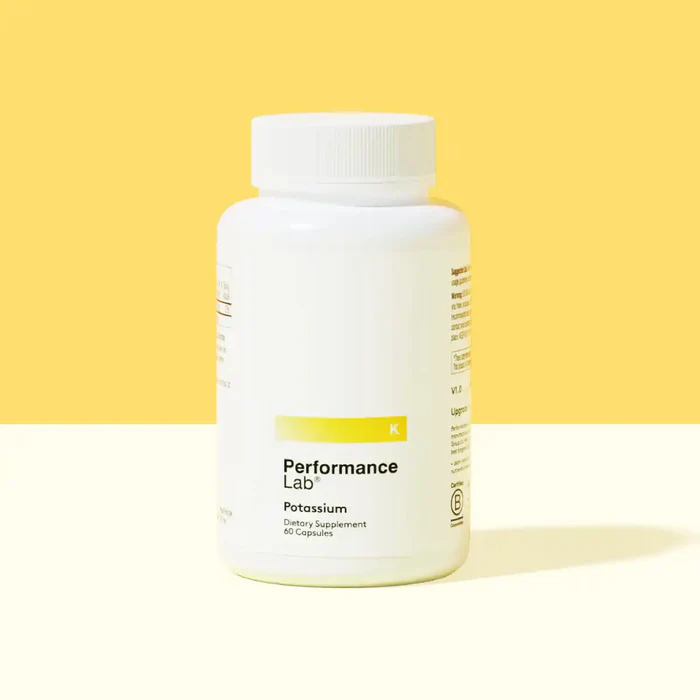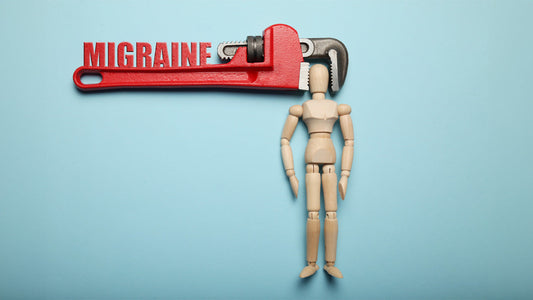Be it from bananas, avocados, cooked spinach, or squash, potassium is an essential part of the diet. And although there are plenty of potassium-rich foods, roughly 97% of Americans aren’t eating enough 1.
Why? Low-sodium diets. But contrary to everything we’ve been told, a low sodium diet can be harmful—and result in low potassium levels.
Key Takeaways
- Morning vs night: There isn’t one “best” time for everyone. Morning can support daytime electrolyte balance and energy; evening may help recovery and limit night cramps.
- Pairing with magnesium: Potassium and magnesium work synergistically for fluid balance, nerve/muscle function and circadian rhythm—just keep sodium adequate for balance.
- Deficiency is common: Many adults fall short on potassium intake; supplement timing should fit your routine and any meds/health context.
- Product fit: Performance Lab® Potassium is positioned as a clean, bioavailable option you can take morning or night; NutriGenesis® Multi is the “morning all-in-one” alternative.
- Safety first: If you have kidney disease, take certain heart/blood-pressure meds, or are advised on potassium intake, talk to your clinician before supplementing.

While boosting your sodium intake may be necessary, increasing your potassium intake is also. They’re two nutrients that work closely together, and when you have sufficient potassium in your diet, it can stop sodium from increasing blood pressure 2, 3.
So much so, that getting enough potassium has more benefits for blood pressure than cutting out sodium 4, 5. Neat, right?
To increase awareness about the importance of potassium in the body, we’ve created a guide to potassium supplementation—what it is, why you need it, and when the optimal time to supplement is.
Let’s get started.
What Is Potassium?
While commonly lumped in with the other electrolytes—sodium, chloride, magnesium, etc.—potassium is an essential mineral in and of itself involved in several biological functions.
And it also happens to be one of the four major nutrient shortfalls in the American diet—especially since the RDI intake to 4,700 mg/day 6.
But perhaps what’s more staggering is that a mere 3% of Americans met the recommended intake before guidelines changes, which is likely even fewer now with a higher intake value.
Potassium is important for heart and bone health, and it’s also known to reduce the risk of stroke and coronary heart disease—two of the leading causes of mortality in the United States. You’ll also find potassium has benefits for blood pressure glucose intolerance, cardiac arrhythmias, and more.
Inadequate intake is the primary cause of deficiency, but for anyone looking to increase their dietary intake, you’re in luck—it’s found in various foods.
For most people eating a balanced diet low in processed foods, potassium intake is generally sufficient, but low levels can lead to symptoms like:
- Muscles weakness
- Fatigue
- Muscle cramps
- Muscle aches and stiffness
- Numbness
- Heart palpitations
- Difficulty breathing
- Gastrointestinal symptoms
- Mood swings
It doesn’t sound pleasant, right? That’s why boosting your intake through a potassium-rich diet or including supplements is essential—and we’ll cover when the best time to take potassium is!
The Functions Of Potassium
1. Regulates fluid balance
The balance of fluid inside your cells (intracellular fluid) and outside your cells (extracellular fluid) is carefully maintained by the concentration of electrolytes, especially sodium and potassium.
When this balance is thrown off, it can lead to cells shrinking or swelling, which interferes with heart and kidney function 7, 8.
2. Supports the nervous system
Nerve impulses that control bodily functions like heartbeat and muscle contractions are generated by the movement of sodium and potassium ions in and out of cells.
The movement alters the cell’s voltage, which produces a nerve impulse. And when potassium levels drop, it affects how the body’s nerves function 9.
3. Regulates muscle contraction
Altered potassium levels can impact the nerve signals that control the heart muscles by altering the voltage of nerve cells.
High blood potassium levels can cause the heart to become dilated and flaccid, which weakens contractions and results in arrhythmias 10, 11.
Likewise, low levels can also alter the heartbeat, which subsequently interferes with blood circulation to the brain, organs, and muscles 12.
So, what does getting enough potassium do for your body?
- Reduces blood pressure
- May protect against stroke
- Supports bone health and reduces the risk of osteoporosis
- May prevent kidney stones
- Reduces water retention
- Regulates glucose levels
Potassium and Sleep
Magnesium has always been touted as the super mineral for sleep, but recent research suggests that its friend, potassium, may be just as beneficial—and this is why swapping your morning potassium supplement for the evening might be ideal.
A recent 2017 study published in Nature Communications shows that red blood cells have their own circadian rhythm 13. Just as humans work on a day and night schedule, so do red blood cells.
But why should you care? RBCs don’t have mitochondria, the energy centers of your body that also control your body clock.
Red blood cells contain their own circadian rhythm that dictates when to be active and when to rest. Still, since they don’t contain DNA, researchers found that fluctuations in potassium levels had a significant impact on red blood cells’ activity and rest.
Specifically, potassium levels increased during the day and decreased at night, and when these levels were altered, cells’ circadian rhythm was, too. Simply put, potassium affects how red blood cells, responsible for transporting oxygen through the body, operate during the day.
Although it may not seem like a huge finding, researchers suggest this could help explain heart attacks occur most often in the morning.
You’ve likely heard that potassium and magnesium work synergistically in the body, serving as important electrolytes and both playing a big role in circadian rhythm.
But because magnesium and potassium together can decrease blood pressure, you want to ensure you’re consuming enough sodium to balance it out.
When Is The Best Time to Take Potassium?

Potassium plays a crucial role in maintaining fluid balance, nerve function, and muscle health. But when is the best time to take it for maximum benefits?
Performance Lab® Potassium offers a highly absorbable form of potassium, perfect for optimizing your daily routine—whether taken in the morning or at night.
Key Benefits Based on Timing:
- Morning Energy Boost: Taking potassium in the morning helps jumpstart your day, supporting electrolyte balance and energy levels. This ensures optimal hydration and performance, making it an ideal choice for morning workouts or busy days.
- Nighttime Recovery: Consuming potassium at night can aid muscle recovery and prevent cramps, especially after an active day. It also helps regulate blood pressure, contributing to restful sleep and overall recovery.
- Electrolyte Balance Anytime: Whether taken morning or night, potassium is essential for maintaining proper fluid balance, supporting your muscles, heart, and nerve function throughout the day.
- Bioavailable and Clean: Performance Lab® Potassium uses easily absorbed potassium chloride to ensure quick, effective replenishment at any time of day. Vegan-friendly, free from synthetic additives, and designed for clean, daily performance.
Whether you're looking to boost energy or enhance recovery, Performance Lab® Potassium is a versatile, clean solution for better health at any hour.
Shop Performance Lab® Potassium
That said, there is no “best” time to take potassium, but recent research suggests that taking potassium –alongside your other vitamins and minerals—in the morning could offer greater benefits.
If you’re not keen on remembering what you need to take when then Performance Lab NutriGenesis Multi offers an easy solution.

It’s a clean, pure, state-of-the-art multivitamin that supplies 100% RDI of 17+ essential vitamins and minerals for optimal health and well-being. That way, you can pop Multi in the morning and know that your red blood cells are set to take on the day.
References
- Agarwal S, Reider C, Brooks JR, Fulgoni VL 3rd. Comparison of prevalence of inadequate nutrient intake based on body weight status of adults in the United States: an analysis of NHANES 2001-2008. J Am Coll Nutr. 2015;34(2):126-134.
- Fujita T, Ando K. Hemodynamic and endocrine changes associated with potassium supplementation in sodium-loaded hypertensives. 1984;6(2 Pt 1):184-192.
- Hedayati SS, Minhajuddin AT, Ijaz A, et al. Association of urinary sodium/potassium ratio with blood pressure: sex and racial differences. Clin J Am Soc Nephrol. 2012;7(2):315-322.
- Houston MC. The importance of potassium in managing hypertension. Curr Hypertens Rep. 2011;13(4):309-317.
- Aburto NJ, Hanson S, Gutierrez H, Hooper L, Elliott P, Cappuccio FP. Effect of increased potassium intake on cardiovascular risk factors and disease: systematic review and meta-analyses. BMJ. 2013;346:f1378.
- Weaver CM. Potassium and health. Adv Nutr. 2013;4(3):368S-77S.
- Campbell I. Physiology of fluid balance. Anaesthesia & Intensive Care Medicine. 2003; 4(10):342-345.
- Scales K, Pilsworth J. The importance of fluid balance in clinical practice. Nurs Stand. 2008;22(47):50-60.
- Cheng CJ, Kuo E, Huang CL. Extracellular potassium homeostasis: insights from hypokalemic periodic paralysis. Semin Nephrol. 2013;33(3):237-247.
- Mushiyakh Y, Dangaria H, Qavi S, Ali N, Pannone J, Tompkins D. Treatment and pathogenesis of acute hyperkalemia . J Community Hosp Intern Med Perspect. 2012;1(4):10.3402/jchimp.v1i4.7372.
- Kes P. Hyperkalemia: a potentially lethal clinical condition. Acta Clin Croat. 2001;40:215-225.
- Helfant RH. Hypokalemia and arrhythmias. Am J Med. 1986;80(4A):13-22.
- Henslee EA, Crosby P, Kitcatt SJ, et al. Rhythmic potassium transport regulates the circadian clock in human red blood cells. Nat Commun. 2017;8(1):1978.















